Parent page: Altium Vault
Each Altium Vault instance has its own dedicated Part Catalog. This is a managed local part catalog database, dedicated to the management and tracking of manufacturer parts and their associated supplier parts. The catalog is installed as a service (Part Catalog Service), provided through the Altium Vault platform, and works only with the Altium Vault.
The local Part Catalog stores items representative of actual Manufacturer Parts, along with one or more items representative of Supplier Parts - the incarnations of those Manufacturer Parts, as sold by the Suppliers/Vendors. Each Supplier Part is a reference to an item in a parts database - either the aggregate parts database of the Altium Parts Provider (which itself interfaces to, and gathers the parts from, enabled Suppliers), or a linked local parts database.
Which Suppliers are actually used - a list of Approved Suppliers as it were - is managed by the Altium Vault. This list is configured through the Altium Vault's browser-based interface. This facilitates centralized supply chain management, with designers across the entire organization using the same approved list of Suppliers, with which to source supply chain intelligence for parts used in their designs.
This document concerns centralized configuration of Suppliers as part of an Altium Vault installation. When using an Altium Vault, you have the ability to create and use Vault-based components, with supply-chain information determined through Part Choices, and sourced through the Vault's local Part Catalog. If you don't have an Altium Vault, and are therefore using component management methodologies that utilize SchLib, DbLib, or SVNDbLib as their 'backbone' for component storage, you are still able to link your components to supplier data, with configuration performed solely as part of your Altium Designer preferences. For more information, see
Linking to Supplier Data.
Accessing Supply Chain Part Sources
Supplier link data sources are added and configured in the Altium Vault through the PART PROVIDERS page (ADMIN » PART PROVIDERS).
Access to, and Management of, the Part Sources and list of Approved Suppliers for an Altium Vault, can only be performed by an administrator of that Vault.
 Enabling required Suppliers and determining Location/Currency ranges for the Altium Parts Provider. This is the default Part Source for the Altium Vault. You can also add
Enabling required Suppliers and determining Location/Currency ranges for the Altium Parts Provider. This is the default Part Source for the Altium Vault. You can also add
any number of links to internal company parts databases. These settings will apply to Altium Designer when signed in to the Vault.
The available Part Sources in the Vault are:
- Altium Parts Provider - an aggregate supplier data service that provides access to live component information from a comprehensive range of parts suppliers. This Part Source is installed by default.
The Altium Parts Provider settings that are established in the Altium Vault will override those in Altium Designer (through the installed Altium Parts Provider extension) when a user signs in to the Vault.
- Custom Database Provider - for situations where parts supply data needs to be accessed from a local database, such as a company’s internal parts database, the Vault's Custom Database Provider feature offers interface connectivity for all common database systems (directly, or via an ODBC or OLE-DB interface). The connection can be established manually, through a nominated interface and connection string, or by using the Vault’s Connection Wizard. Any number of such connections can be defined.
A database connected to by the Custom Parts Provider interface system must be locally available to the Altium Vault - that is, the database itself must be located on the PC that hosts the Vault. In addition, for Altium Designer to be able to interface to any parts database connection that has been setup in the Vault, the Custom Database Parts Provider extension must be installed as part of your Altium Designer installation (which it is by default).
The actual supply chain intelligence - comprising Manufacturer (and part number), Supplier (and part number), Description, Pricing and Availability - is sourced from the Vault's local Part Catalog and the relevant Part Source.
Use the associated icon in the
Enabled column to toggle the state of the part source between enabled (

) and disabled (

). To remove a part source, click the
Remove control (

). Note that the Altium Parts Provider can be disabled, but cannot be removed.
Configuring the Altium Parts Provider
To configure the available suppliers for the Altium Parts Provider source, either click on its name, or its associated edit button ( ).
).
 Accessing the configuration page for the default part source - the Altium Parts Provider.
Accessing the configuration page for the default part source - the Altium Parts Provider.
Options to configure include the following:
- Locations - enable which geographical regions the parts service will collate parts data from. While many suppliers are multi-regional, if a part is uniquely available in a specific location, it will only be listed if that region is enabled. Click the
 button to access the Locations dialog, from where you can specify which locations are to be used (enabled) and also change priority, so that search results from preferred locations are returned first.
button to access the Locations dialog, from where you can specify which locations are to be used (enabled) and also change priority, so that search results from preferred locations are returned first.
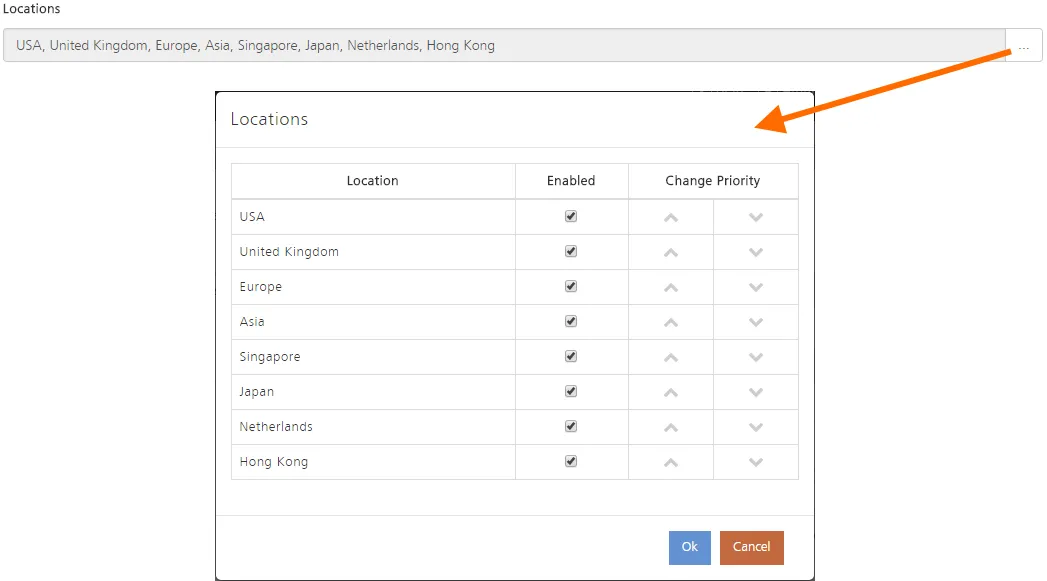
- Currencies - enable which international currencies will be available for selection when searching for parts and examining results. Click the
 button to access the Currencies dialog, from where you can specify which currencies are to be used (enabled) and also change priority.
button to access the Currencies dialog, from where you can specify which currencies are to be used (enabled) and also change priority.

- Suppliers - enable which Suppliers to include when performing a supplier data search. Only part results from those Suppliers will be returned. By including more Suppliers for use with the feature, you are able to compare and shop for the best deals on the components required by your design.
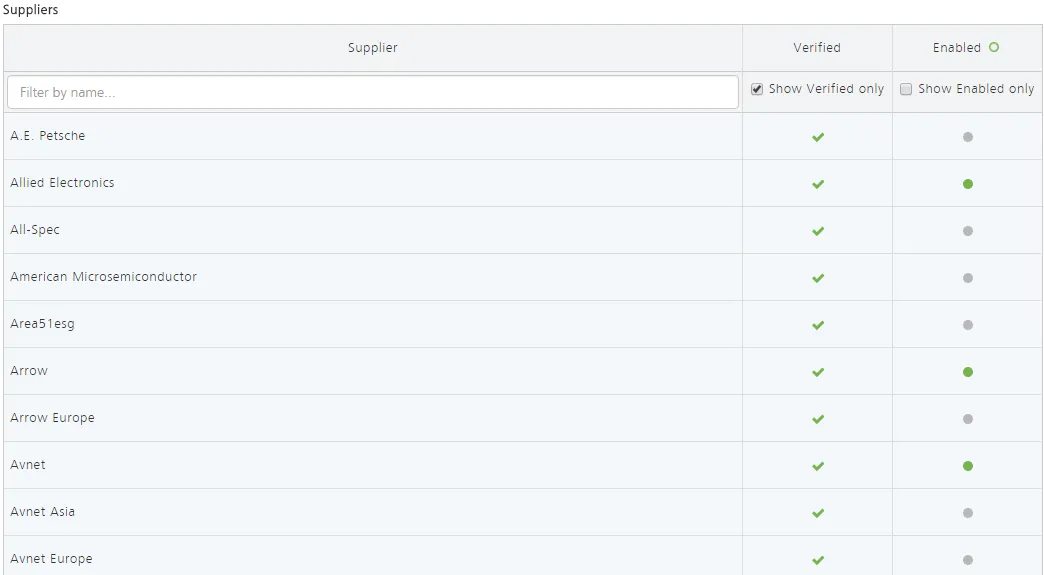
Working with the Suppliers grid:
- Suppliers can be filtered using the field at the top of the list, allowing you to quickly browse the large range of available Suppliers more easily.
- Use the associated icon in the Enabled column to toggle the state of the Supplier between enabled (
 ) and disabled (
) and disabled ( ).
).
- Use the icon to the right of the Enabled column header to quickly enable or disable all Suppliers.
- Use the Show Verified only option to present only those Suppliers that are Verified. This simply means that a Supplier is a partner of the aggregator service that underlies the Altium Parts Provider, has proven to own its own stock, and its data feeds are real (considered trustworthy).
- Use the Show Enable only option to present only those Suppliers that are currently enabled (
 ).
).
Configuring a Custom Database Part Source
When installed in Altium Designer, the Custom Database Provider extension will port component data information from a parts database interface connection that has been set up in the Altium Vault. The database accessed by the Vault is typically an internal company parts reference that offers data such as company and manufacturer part numbers, along with other parameter information that is specifically relevant to the organization.
With the exception of installing the Custom Database Provider extension in Altium Designer and being signed into the Altium Vault, no setup is required in Altium Designer to access that supplier data. All ODBC, OLE-DB, SQL etc connections to parts databases are managed by the Altium Vault.
Database Provider Setup
The connection to a company's internal parts database can be established manually, through a nominated interface and connection string, or by using the Vault’s Connection Wizard - which automatically determines the interface and connection string.
The database must be locally available to the Altium Vault - that is, the database itself must be located on the PC that hosts the Vault.
To initiate the database connection setup, click the  button, at the top-right of the Part Providers page. The Add New Part Source page will present. Enter a Name for the new source, and then select the Manual- or Wizard-based approach to establish the database link.
button, at the top-right of the Part Providers page. The Add New Part Source page will present. Enter a Name for the new source, and then select the Manual- or Wizard-based approach to establish the database link.
The Wizard, activated by the  button, simply requests the type and location of the database you wish to connect to. It also allows the connection to be tested for confirmation that the database has been successfully accessed.
button, simply requests the type and location of the database you wish to connect to. It also allows the connection to be tested for confirmation that the database has been successfully accessed.
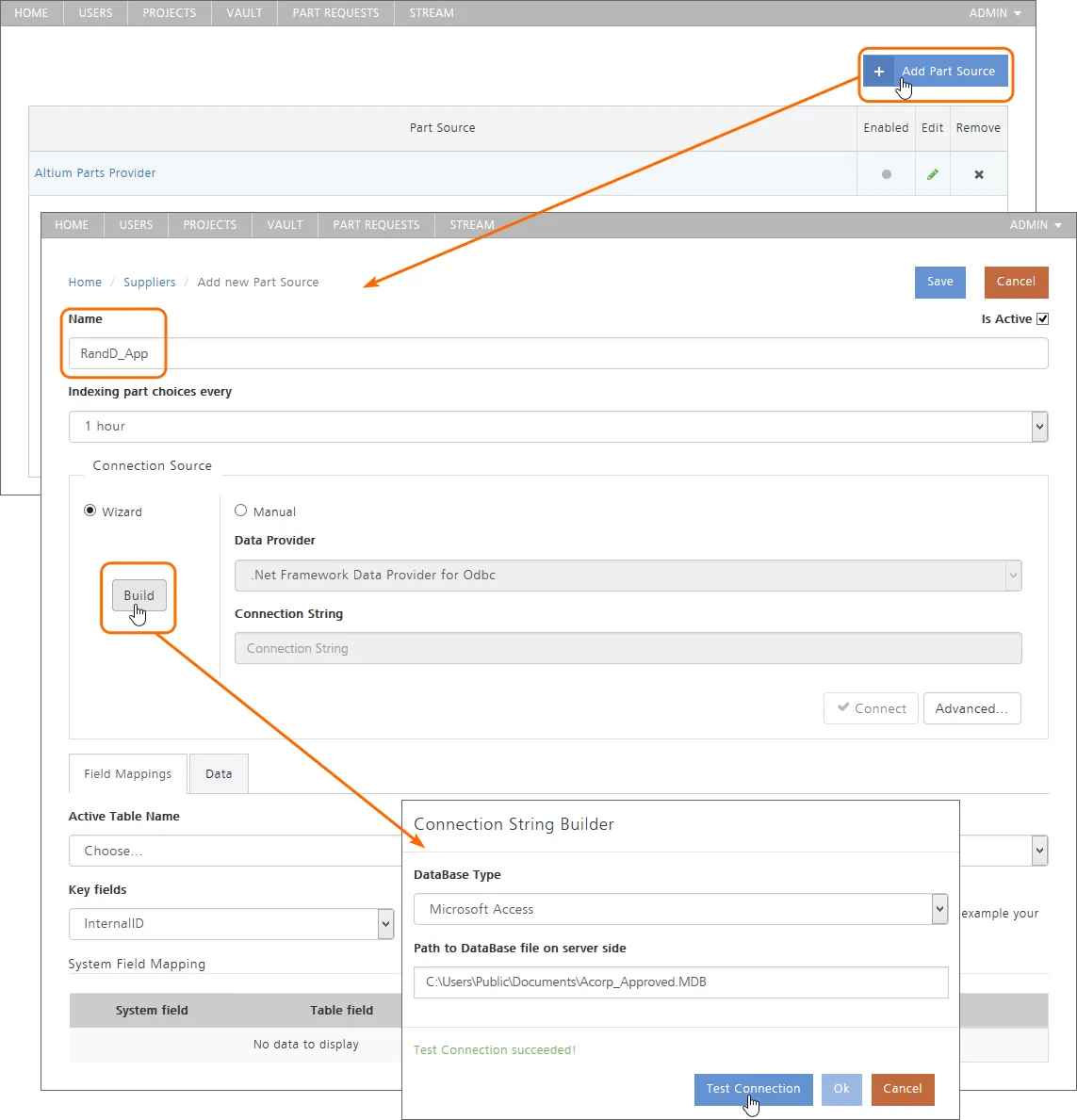
A Vault database connection can be made manually, by entering the interface method and connection string, or by simply running the Connection Source Wizard.
With connection testing successful, click OK in the Connection String Builder dialog - connection to the database will be made, as verified by the  button changing to
button changing to  , and the string Connection succeeded! displayed to its left.
, and the string Connection succeeded! displayed to its left.
If the (x64) machine hosting the Vault does not have Microsoft Access® 2007 or Microsoft Excel® 2007 Database types available, the
Microsoft Database Access Engine may need to be installed for connecting to an Access database.
Manual Connection
The database connection Wizard provided by the Vault’s Add new Part Source page is a simple and quick way to establish the connection to a local Parts Source database, and should suit most situations. When the target database type and its connection requirements are less straightforward, the Manual connection method may be needed.
In this case the (.Net) Data Provider setting and its Connection String are manually specified, as determined by the target database. See the Connection Strings web reference for helpful information on creating connection strings for a wide range of databases.
Further SQL connection options are available in the Advanced Settings dialog, opened with the  button.
button.

The Advanced Settings dialog offers fields for Left and Right Quote Character settings, which need to be correct to allow the system to successfully build SQL queries. Note that different database systems will use a different set of characters, for example:
- MsSQL, Access and Excel use the square bracket pair:
[ ]
- Oracle uses the double quote:
"
- MySql uses the character:
`
The Advanced Settings dialog also offers an optional field for defining a case insensitivity function for the database (Function name for ignoring case-sensitive), which might include the UPPER keyword for example.
Manual Connection Examples
Access database:
- Data Provider - select the
.Net Framework Data Provider for OleDb option.
- Connection String - specify
Provider=MICROSOFT.JET.OLEDB.4.0;Data Source=myDatabase.mdb (where myDatabase.mdb is the name/path the local database file). See the Access 2000 connection template guide.
- Advanced Settings - the Quote Characters are the
[] pair (no change required, as this is the default setting).
MySQL database:
- Data Provider - select the
.Net Framework Data Provider for MySQL option.
- Connection String - specify
Server=myServerAddress;Database=myDataBase;Uid=myUsername;Pwd=myPassword; (where myxxx represents the server name, database name and the login credentials for the local MySQL database). See the MySQL connection template guide.
- Advanced Settings - set the Quote Characters to
`
With the Data Provider, Connection String, and any advanced settings defined as required, click the  button to connect to the database. If the connection is successful, the button will change to
button to connect to the database. If the connection is successful, the button will change to  , and the string Connection succeeded! displayed to its left. If there is an issue, the button will remain in disconnected mode (
, and the string Connection succeeded! displayed to its left. If there is an issue, the button will remain in disconnected mode (  ), and information about why the connection is failing will be presented to the left (e.g. The 'MICROSOFT.JET.OLED.4.0' provider is not registered on the local machine).
), and information about why the connection is failing will be presented to the left (e.g. The 'MICROSOFT.JET.OLED.4.0' provider is not registered on the local machine).
Part Choice Re-indexing
After modifying data in a defined Part Source - for example changes in the existing connected company parts database, or pointing to a different database - that Part Source should be re-indexed, so that searching for components can be optimized for speed. This entails re-indexing the part choices for that Part Source.
Use the Indexing part choices every field to specify an automated re-indexing interval. A range of intervals are provided, from every minute, up to every 10 days. The default interval is 1 hour, but if you don't want this automated re-indexing to occur, set the field to None.
You can also perform a manual re-indexing of the part choices for one or more specified (custom database) Part Sources, by using the command line based
Vault Configuration tool -
avconfiguration.exe. For more details, see
Command Line Tool for Vault Management.
Database Table Access
The completion of the Manual or Wizard process establishes the correct Database interface and connection string. Since a single database can include multiple tables and database elements, the required table data must be selected for access through the Active Table Name drop down menu. Note that a single database could contain several tabular variations of Manufacture Part Number information, for example.
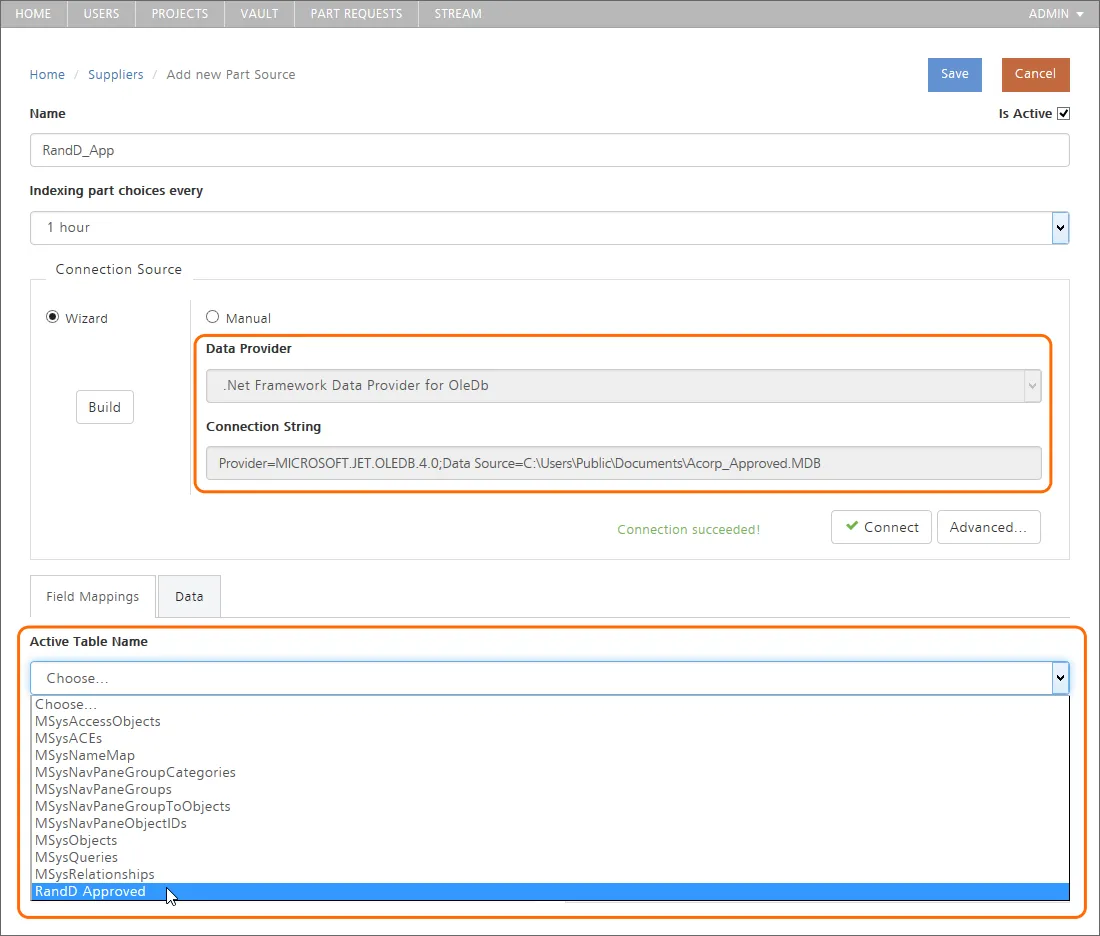
Once the database connection is established, the correct table data within the database must be nominated.
When the database and its constituent table connections established, its contents are viewable under the Data tab, which can be used a guide to mapping the database fields to the Vault Part Source fields.
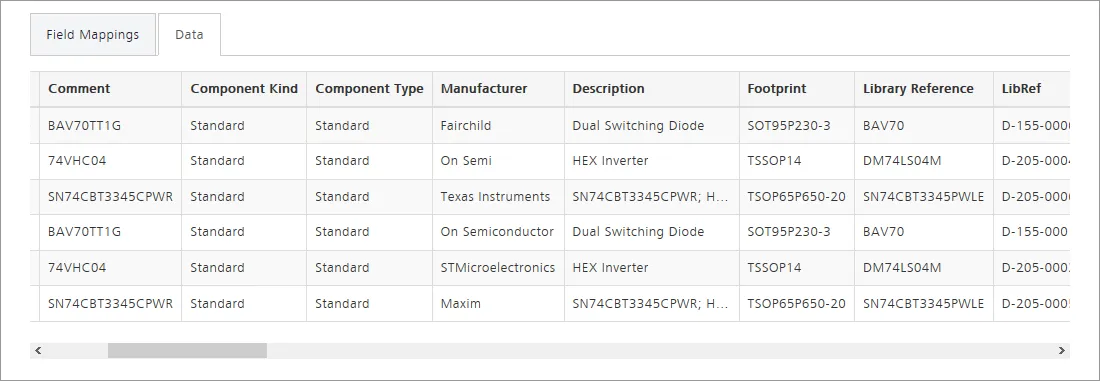
The Data tab provides a direct view of the connected database table contents.
The connected database Field data is mapped to the Vault Part Source System Field data via the comparative column listings under the Field Mappings tab, which allows the database entries to be assigned to matching Data Provider entries in the Vault. The system will automatically link equivalent field names, while the drop down list on each entry can be used to manually select a suitable field - in the below screen image, the Costing database field is being mapped to the Price system field, the Manufacturer PtNo to Manufacturer Part Number, and so on. A field may also be disabled from the parts searching process.
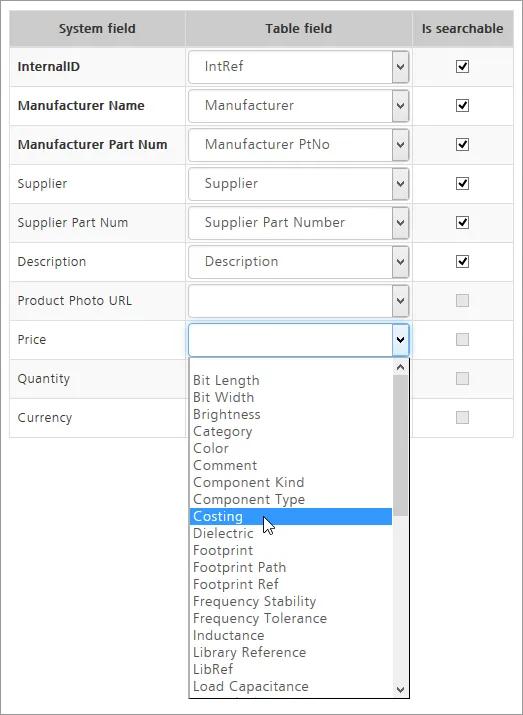
Map the main System Fields to comparative fields in the source database, so that
searches will behave as expected and suitable Manufacturer/Supplier information
will be returned.
Note that an ID reference field must be nominated as a key index field (Key Fields) for the database mapping - this would normally be a proprietary ID that is unique to each entry, such as a internal company part number. Save the New Part Source configuration when the System Fields have been suitably mapped to the connected database.

The completed data field mapping process will provide live database data to the Vault and the Custom Parts Provider service. The setup can be subsequently edited
as required.
Accessing Custom Database Parts Information
If the database Parts Source is enabled for use in the Vault, but the Altium Parts Provider service is not, the company's custom parts database will be the sole source of Manufacturer/Supplier information in Altium Designer, when signed in to the Vault.
This can be seen in the Add New Part Choice dialog when making a manual Part Choice in an Altium Designer Active BOM document, or in the Part Choices dialog opened from the Vaults panel when adding supplier information to a Vault-based Managed Component. Note that the Pricing and Stock information is determined by the data extracted from the central database table, which is connected through the Custom Parts Provider interface.
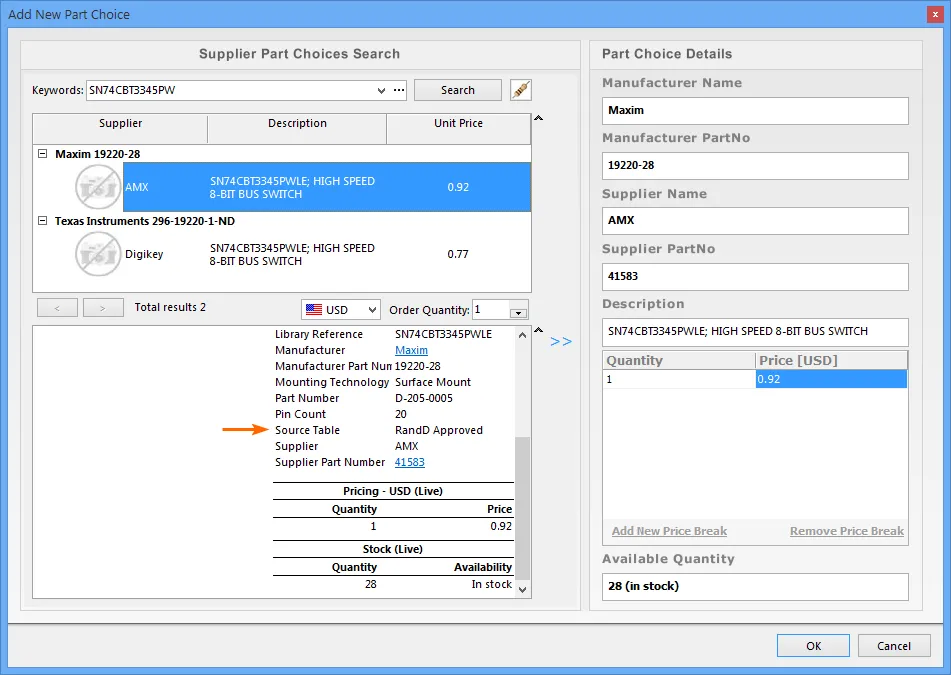
Parts Database information sourced through the Custom Parts Provider service, including localized Pricing and Quantity data, is available to the ActiveBOM document.
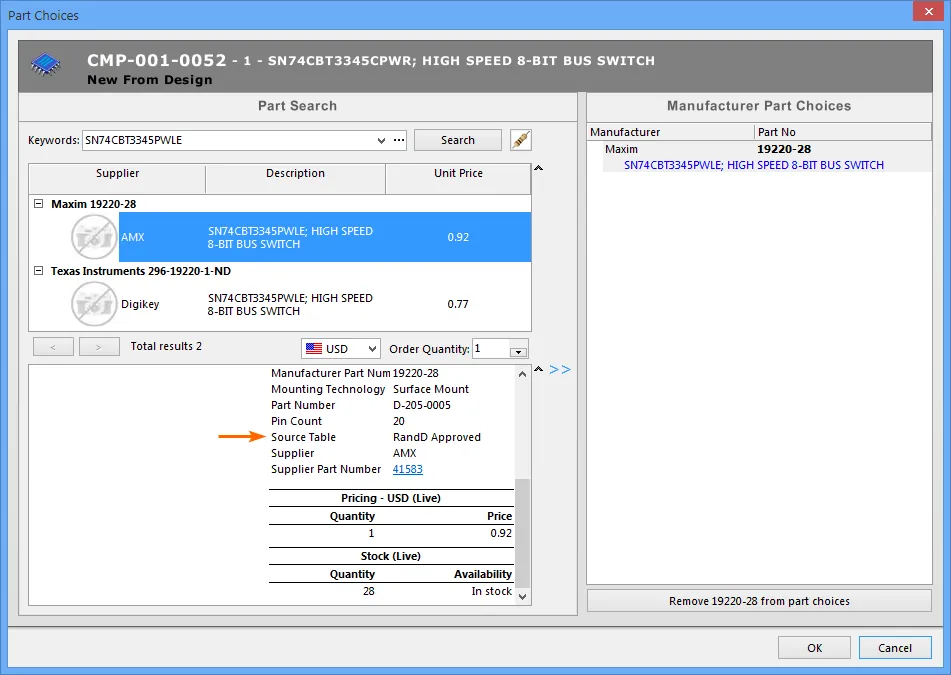
Manufacturer and supplier information sourced from a local Parts Database can be directly added to components in the Vault as a Parts Choice list.
A Word About...Supplier Preferences
Related page: Linking to Supplier Data
The Data Management - Suppliers page of the Preferences dialog is command-central for configuring which Suppliers will be available when searching for parts data, along with other options relating to linking to Supplier data.
 Configure options relating to the feature to link to Supplier data, as part of your Altium Designer preferences.
Configure options relating to the feature to link to Supplier data, as part of your Altium Designer preferences.
The appearance and functionality of the page depends on various factors:
- Whether the Altium Parts Provider extension is installed as part of your Altium Designer installation.
- Whether you are signed into an Altium Vault or not.
- Whether you have installed any individual Supplier extensions as part of your Altium Designer installation.
The following sections take a closer look at how the page is affected by these various factors.
Altium Parts Options
This section changes as follows:
- Altium Parts Provider extension not installed - the Altium Parts Provider extension is installed by default, but if you have inadvertently (or purposefully) uninstalled it, the Altium Parts Options section of the page will not be presented. No matter what you have configured on the Vault side, without the Altium Parts Provider extension installed, the ability to link to Supplier data will still not be available when you sign into your Vault.
 If the Altium Parts Provider extension is not installed as part of your installation of Altium Designer, the ability to link to Supplier data will not be possible, even if you have
If the Altium Parts Provider extension is not installed as part of your installation of Altium Designer, the ability to link to Supplier data will not be possible, even if you have
configured the provider on the Vault side, and are signed into that Vault.
You must have the Altium Parts Provider extension installed to be able to link to Supplier data. Configuration of the Suppliers available can then be through the preferences (not signed into Vault) or centrally from the Vault (signed into Vault), as detailed below.
- Altium Parts Provider extension installed AND not signed into an Altium Vault - the Altium Parts Options section is presented on the page and is fully editable. Use this to configure the aggregate supplier data service to suit your needs. By default, the individual Suppliers that can be installed through separate extensions are enabled in the list of Suppliers.
 Options for configuring Suppliers - when the Altium Parts Provider extension is part of your Altium Designer installation, and you are not signed into an Altium Vault.
Options for configuring Suppliers - when the Altium Parts Provider extension is part of your Altium Designer installation, and you are not signed into an Altium Vault.
- Altium Parts Provider installed AND signed into an Altium Vault - while you remain signed into the Vault from Altium Designer, the Altium Parts Options region becomes read-only and adopts those settings defined for the Vault (specifically, the Altium Parts Provider parts source, within the PART PROVIDERS area of the Vault's browser interface). Text will appear above the section to remind you of this. Refer back to the section Configuring the Altium Parts Provider for more information.
 While signed in to your Altium Vault, the Altium Parts Options section will simply be a read-only reflection of what has been centrally configured in the Vault.
While signed in to your Altium Vault, the Altium Parts Options section will simply be a read-only reflection of what has been centrally configured in the Vault.
When you make any changes to the Altium Parts Provider part source through the Altium Vault, you will need to sign out of the Vault and back in again - within Altium Designer - to refresh and see those changes on the Data Management - Suppliers page.
When using Individual Supplier Extensions
If you have specific part supplier extensions installed, these are listed in the Available Suppliers section at the bottom of the Data Management - Suppliers page. These can be enabled/disabled, and ordered by priority, as required.
 Any specific (legacy) supplier services extensions that have been enabled, will work in conjunction with those enabled for the Altium Parts Provider, but
Any specific (legacy) supplier services extensions that have been enabled, will work in conjunction with those enabled for the Altium Parts Provider, but
take precedence.
If an account is already held with a Supplier (existing customer), you may be entitled to special pricing or products that are not available in that Supplier's public catalog. If this is the case, simply ask that Supplier's sales representative for a username or customer number that can be used with their Web Service. Having gained this information, enter it into the options section for that particular supplier.
Making use of these additional supplier options is a wholly optional exercise. You are not required to fill out these details in order to link to Supplier data, they simply offer additional benefits for those users that are existing customers of a particular supplier, should they wish to access them.
Note that if you are signed in to an Altium Vault from Altium Designer, the Available Suppliers region will not be presented, since individual supplier services are not supported by the Altium Vault.